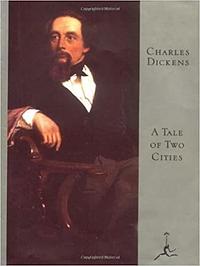Take a photo of a barcode or cover
A classic. If you only read one Dickens book in your lifetime, read this one.
Okay, so. This is not the best I have thus far read of Dickens, because although it's set in the French Rev (!) it is much more ~serious and humourless in tone than the Dickens I like. I still like the narration but miss the eccentricity. Because it's all so serious the first two books were honestly kind of a slog (the only reason I kept going was to read more Sydney Carton scenes tbh) but by book three, when all the action kicked off, I was Actually Pretty Into It?
But I can't really divorce it in my mind from Les Mis, and this really is like a diet version of Les Mis (although I know, I know, this was published first, Dickens and Hugo Couldn't Have Known, whatever). Except the Manette/Valjean and Lucie/Cosette and Darnay/Marius parallels were too in my face to properly ignore, and this novel was just, in no way as good as Les Mis, not by a long shot.
(I love Sydney Carton to pieces, though, and if you know anything about my taste in fictional characters this will Not Surprise You. From Wikipedia: "Carton is portrayed as a brilliant but depressed and cynical drunkard who is full of self-loathing because of what he sees as his wasted life. He feels a deep unrequited love for Lucie Manette, who nevertheless inspires him to try to be a better person." like ffs I loved him immediately, what can I even say...)
But I can't really divorce it in my mind from Les Mis, and this really is like a diet version of Les Mis (although I know, I know, this was published first, Dickens and Hugo Couldn't Have Known, whatever). Except the Manette/Valjean and Lucie/Cosette and Darnay/Marius parallels were too in my face to properly ignore, and this novel was just, in no way as good as Les Mis, not by a long shot.
(I love Sydney Carton to pieces, though, and if you know anything about my taste in fictional characters this will Not Surprise You. From Wikipedia: "Carton is portrayed as a brilliant but depressed and cynical drunkard who is full of self-loathing because of what he sees as his wasted life. He feels a deep unrequited love for Lucie Manette, who nevertheless inspires him to try to be a better person." like ffs I loved him immediately, what can I even say...)
slow-paced
Plot or Character Driven:
Plot
Loveable characters:
No
Diverse cast of characters:
No
“…long ranks of the new oppressors who have risen on the destruction of the old”
A wee 18th century premonition on Keir Starmer’s prospective Labour Govt
A wee 18th century premonition on Keir Starmer’s prospective Labour Govt
Είναι η πρώτη φορά που διαβάζω Ντίκενς. Η γραφή, η λυρικότητα της και αυτή η λεπτή του ειρωνεία, μου άρεσε πολύ. Οι περιγραφές των φρικαλέων γεγονότων που έλαβαν χώρα κατα τη διάρκεια της Γαλλικής Επανάστασης ώρες ώρες ανατριχιαστικές και η ατμόσφαιρα υποβλητική. Τις τελευταίες 200 σελίδες δε, ξενύχτησα διαβάζοντας τες. Καιρό είχα να το κάνω αυτό! Το τέλος με συγκίνησε και με άφησε με πολλά συναισθήματα.
Πολύ δυνατό και αληθινό βιβλίο και δεν το περίμενα!
Στο μέλλον σίγουρα θα διαβάσω κι άλλα δικά του!
Πολύ δυνατό και αληθινό βιβλίο και δεν το περίμενα!
Στο μέλλον σίγουρα θα διαβάσω κι άλλα δικά του!
this book brought me to tears it waz so sad! but really good!
This is the best Dickens I have (hitherto) read. It succeeds without reliance upon polars of good and evil, instead blurring many of the character's ethics. The richest example is Madame Defarge, a Victorian Lady Macbeth, whose hunger for vengeance assimilates her further and further, until without pity she can turn on those she loves. She is introduced to the reader as the taciturn wife of a revolutionary, and gradually, as with the knitting she occupies herself with, the full picture is revealed. I found myself loving her strength, and her almost comical interposition in major events of the French Revolution. She is the embodiment of the French Revolution's increasing, inexorable, violent momentum.
The notes of this edition were of extreme value, it appears much of the text was based on Thomas Carlyle's historical account 'The French Revolution', to the extent that Dickens has taken minor anecdotes in order to paint a more vivid picture. The final chapter includes an absurd reference to a Mme. Roland who requested a pen and paper before her execution at the Guillotine in order to document some fascinating thoughts she was having. What integrity! Lois-Sebastien Mercier is also heavily cited, on top of Rousseau, the Arabian Nights, and The New Testament.
Dickens paints the Guillotine as the equivalent of the Christian Cross, and frequently uses his figurative skill to highlight the barbarity (as well as the efficiency) of the executional method. Another of my favourite Dickensian images was the 'fishing' of corpses by Jerry Cruncher. Dickens overly extends his metaphors creating a dramatic irony that at once represents the minds of the naive (in this case, Jerry's observing son) as well as highlighting the terrifying banality of it during these times.
It is impossible to write a concise book review, so I will leave off here saying that I am now tempted to read Dickens' other great historical work, 'Barnaby Rudge', as he represents the period in a way that appeals to me.
The notes of this edition were of extreme value, it appears much of the text was based on Thomas Carlyle's historical account 'The French Revolution', to the extent that Dickens has taken minor anecdotes in order to paint a more vivid picture. The final chapter includes an absurd reference to a Mme. Roland who requested a pen and paper before her execution at the Guillotine in order to document some fascinating thoughts she was having. What integrity! Lois-Sebastien Mercier is also heavily cited, on top of Rousseau, the Arabian Nights, and The New Testament.
Dickens paints the Guillotine as the equivalent of the Christian Cross, and frequently uses his figurative skill to highlight the barbarity (as well as the efficiency) of the executional method. Another of my favourite Dickensian images was the 'fishing' of corpses by Jerry Cruncher. Dickens overly extends his metaphors creating a dramatic irony that at once represents the minds of the naive (in this case, Jerry's observing son) as well as highlighting the terrifying banality of it during these times.
It is impossible to write a concise book review, so I will leave off here saying that I am now tempted to read Dickens' other great historical work, 'Barnaby Rudge', as he represents the period in a way that appeals to me.
adventurous
emotional
informative
medium-paced
Plot or Character Driven:
A mix
Strong character development:
Complicated
3.85. I feel that whilst set up is needed for a story, this one went on a fraction too long, making it not the easiest book to get in to, but after that it was fine.
It’s winter, so Dickens season. This book has been on my to read shelf an embarrassingly long time. Probably at least a decade. Set during and before the French Revolution in London and Paris (the proverbial Two Cities), the story follows Dr. Manette and his daughter and critiques both the bloody methods of the revolutionaries and the excess and greed of the upper classes that led to the revolution. I enjoyed it. This book has more plot than many of Dickens’s other books, but less vibes. I kinda like the vibes more, I think. None of the characters in this book are very memorable the way the characters in David Copperfield or Oliver are. Not to say it isn’t good, because it is. I just thought I would like it more than I did.






